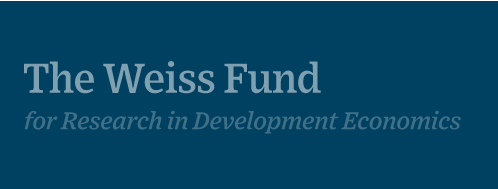Welcome
Robin Burgess is a Professor of Economics, Co-Founder and Director of the International Growth Centre and Director of the Economics of Environment and Energy Research Programme, all at the LSE. He is Co-Director (with Michael Greenstone) of the Coase Project on the Economics of Climate, Energy and Environment, was the past President of BREAD, serves on the Board of Voxdev and CEGA and is an Affiliate of J-PAL and Y-RISE, a Research Fellow in CEPR and CESifo and a Fellow of the British Academy and the Econometric Society. His main interests are in the areas of environmental economics, development economics and political economy and he is currently working in Bangladesh, Brazil, China, India, Indonesia, Kenya, Myanmar, Pakistan, South Korea and Uganda.
AFFILIATIONS
Recent Highlights
For all Research highlights, click here.
LSE Environment Week 2025
The Economics of Environment and Energy Programme (EEE), International Growth Centre (IGC) and Programme on Innovation and Diffusion (POID) within the LSE Department of Economics will convene the fourth Environment Week at LSE in September 2025. Working with partners at the school and across the world, we want to use Environment Week to encourage economists from all fields of economics to work on environmental issues and to connect this work to policy change. Details regarding the call for papers and conference dates will follow soon.
Environmental Populism Conference
Climate policy provides fertile ground for populist mobilisation for several reasons. While the scientific case for sustainability is clear and its economic and social benefits well-established, climate policies create winners and losers within and across countries. To take a key example, these policies require complex transfers, which are often infeasible or politically contentious. Those who bear the costs, especially poor countries and non-elite groups in richer countries, become natural targets for populist appeals.
This conference explores our understanding of the contentious politics of climate policy focusing on ideology, economic interests, and institutional design.
Conference Dates: Thursday 15 – Friday 16 May
Venue: LSE Campus
LSE Environment Camp 2025
The Economics of Environment and Energy Programme (EEE) and the Programme on Innovation and Diffusion (POID) in the LSE Economics Department are pleased to announce the second LSE Environment Camp, taking place on May 14–15, 2025, at the LSE. This two-day conference aims to provide PhD students from all fields of economics with an opportunity to present new research on environmental issues, engage with future colleagues, and receive valuable feedback.
The call for papers is now closed, and successful applicants will be notified by March 31, 2025.
2025 ESIF - Economics+Climate Science (ESIFCLIM)
The Econometric Society Interdisciplinary Frontiers (ESIF) and CEPR conference on Economics+Climate Science, was run in conjunction with and was hosted by the Barcelona School of Economics, in Barcelona, on March 27-28, 2025.
The purpose of the meeting was to foster interaction of ideas and methodologies from the areas of Climate Science and Economics. The conference featured keynote lectures and parallel sessions, bringing together scholars from both fields.
The main goal of the conference was to bring together climate researchers and economists to advance our common understanding of major research and policy gaps in mitigation actions, and to foster ideas and work surrounding implementation of mitigation actions and policies. Key examples are how to speed up the energy transition and deal with its bottlenecks, how to direct efforts to hard-to-abate sectors, how to induce effective and faster behavioral change, and how nature based solutions can be effectively activated.
LSE Environment Week 2024
The Economics of Environment and Energy Programme (EEE), International Growth Centre (IGC) and Programme on Innovation and Diffusion (POID) within the LSE Department of Economics is convening the third Environment Week at LSE. Working with partners at the school and across the world, we want to use Environment Week to encourage economists from all fields of economics to work on environmental issues and to connect this work to policy change.
LSE Environment Camp 2024
The Economics of Environment and Energy Programme (EEE), International Growth Centre (IGC) and Programme on Innovation and Diffusion (POID) in the LSE Economics Department are organising Environment Camp on May 2-3rd 2024 at the London School of Economics. LSE Environment Camp will be a two-day conference designed to provide PhD students from all fields of economics the opportunity present new research on environmental issues, interact with future colleagues, and receive valuable feedback.
IZA/FCDO ONLINE Development Economics Course
The biggest puzzle in economics is why fundamentally equal humans living in different countries enjoy very different standards of living. The aim of this course is to bring together the very latest research in development economics that tries to answer this puzzle.
We will follow the arc of development, which starts with small subsistence entrepreneurs (normally in agriculture) and ends in large complex multinational enterprises. We will analyze how man-made organizations trade with one another, how they affect the environment in which they live and how the environment affects them in return. We will finally analyze the role of the state in regulating markets, coordinating economic activity and containing externalities.
LSE Environment Week 2023
The Economics of Environment and Energy Programme (EEE), International Growth Centre (IGC) and Programme on Innovation and Diffusion (POID) within the LSE Department of Economics is convening the second Environment Week at LSE on 11-14 September 2023. Working with partners at the School and across the world we want to use Environment Week to encourage economists from all fields of economics to work on environmental issues and to connect this work to policy change.
LSE Environment Camp 2023
The Economics of Environment and Energy Programme (EEE), International Growth Centre (IGC) and Programme on Innovation and Diffusion (POID) in the LSE Economics Department are organising Environment Camp at the London School of Economics. LSE Environment Camp will be a two-day conference designed to provide PhD students from all fields of economics the opportunity present new research on environmental issues, interact with future colleagues, and receive valuable feedback.
EC330 Environmental Economics
with Clare Balboni, a new undergraduate environmental economics course is available at LSE.
Tropical deforestation survey
Tropical deforestation is a major driver of global emissions. With Allan Hsiao, we survey the literature and discuss next steps for researchers and policymakers.
Environment Week 2022
Robin Burgess organized the first LSE environment week, co-chaired by Clare Balboni, Tim Dobermann, Pol Simpson and John Van Reenen, with more than 40 papers, 30 public events, 3 master classes and 4 policy round tables.
The details of the programme and recordings from public lectures are available at: https://www.lse-environment-week.com/
Bureaucracy and Development
With Timothy J. Besley, Adnan Khan and Guo Xu
The Annual Review of Economics, 2022, 14: 397-424.
Abstract
The Economics of Tropical Deforestation
With Clare Balboni, Aaron Berman and Benjamin A. Olken
Forthcoming, The Annual Review of Economics
Abstract
Why Do People Stay Poor?
With Oriana Bandiera, Clare Balboni, Maitreesh Ghatak and Anton Heil
The Quarterly Journal of Economics, 2022, 137(2) 785-844
Published version Oriana's Slides
Press Coverage: VoxDev (Clare's Video), Of Dollars and Data, VoxDev (Maitreesh's Video), LSE Research for the World Magazine
Abstract
econimate video
Conference Presentation
The Origins and Control of Forest Fires in the Tropics
With Clare Balboni and Ben Olken
Resubmitted, The Review of Economic Studies
Abstract
Electricity Demand and Supply on the Global Electrification Frontier
With Michael Greenstone, Nicholas Ryan and Anant Sudarshan
Resubmitted, American Economic Review
Press Coverage: The Economist, IGC Blog, Forbes
Abstract
Short Video
Full Documentary
The Search for Good Jobs: Evidence from a Six-Year Experiment in Uganda
With Oriana Bandiera, Vittorio Bassi, Imran Rasul, Munshi Sulaiman and Anna Vitali
Revise and Resubmit, Journal of Labor Economics
Press Coverage: J-PAL blog






















